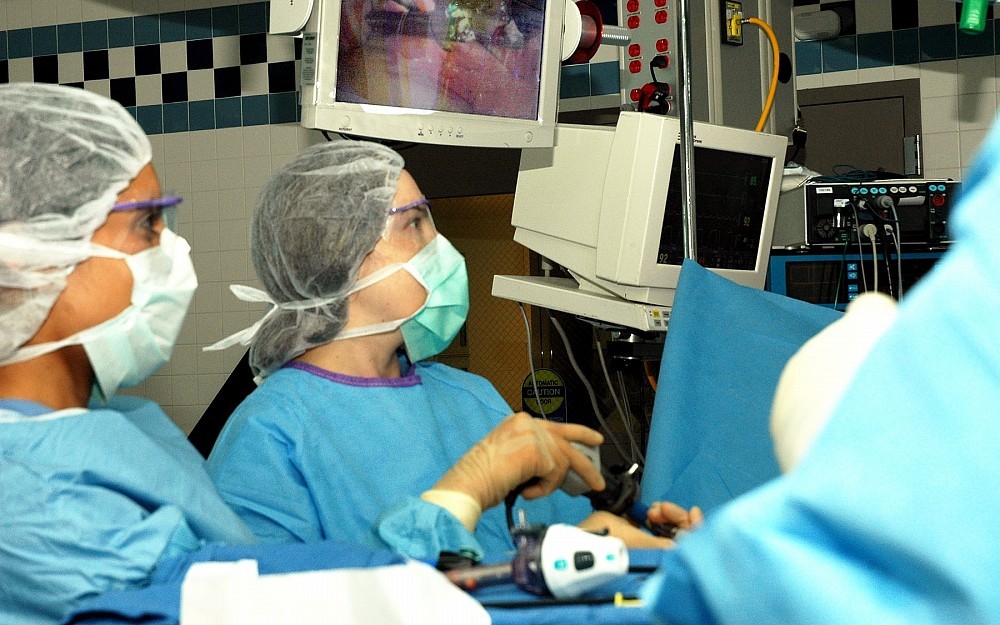
UC HEALTH LINE: Rare Cancer Linked to Advanced Acid Reflux Disease
CINCINNATIAmericans who experience chronic symptoms of gastroesophageal reflux disease (GERD) need to know about an advanced form of the disease that may increase their risk for esophageal cancer.
That disease, known as Barretts esophagus, causes abnormal tissue to form in the lower part of the esophagus. Research has shown that patients with this advanced form of GERD are up to 40 times more likely to get esophageal adenocarcinoma, a rare form of cancer that starts in glandular cells responsible for creating and secreting mucus from the esophagus.
The esophagus is a tube-shaped organ that carries food, liquids and saliva from the mouth to the stomach. Flow is controlled by sphincter muscles that automatically relax when a person swallows to allow substances to pass into the stomach. Most of the time, these muscles are contracted to prevent the stomachs contents from leaking back into the esophagus.
The real risk for developing Barretts esophagus is in patients with chronic, symptomatic reflux, explains Sandra Starnes, MD, thoracic surgeon and assistant professor at the University of Cincinnati. Its very difficult to determine who should undergo screening exams for esophageal cancer, though, because symptoms dont always coordinate reliably with the risk of developing Barretts.
The belief, she adds, is that the irritation caused by fluids backing up from the stomach into the lower section of esophagus may lead to Barretts esophagus.
Although the National Institute of Diabetes and Digestive and Kidney Diseases estimates that just 1 percent of the 700,000 people diagnosed with Barretts esophagus will develop esophageal adenocarcinoma, it is one of the most rapidly rising cancers diagnosed in the United States.
Symptoms of esophageal cancersuch as painful or difficult swallowing and severe weight lossusually do not occur until the cancer has advanced. Because esophageal cancer may have very few noticeable symptoms in its early stages, an endoscopic tissue biopsy is the only definitive way to diagnose the disease. During this test, the physician inserts a flexible tube equipped with a light and tiny camera (endoscope) into the esophagus and examines it and the top of the stomach for abnormalities. Tissue samples are only removed if something looks suspicious.
People who have difficulty swallowing or experience pain when swallowing should ask their primary care physician about an endoscopic test, as they may be signs of advanced esophageal cancer.
The American College of Gastroenterology recommends that patients who have long term reflux symptomsespecially people over 40should have their upper gastrointestinal tract examined to determine whether they have developed Barretts esophagus, she says. If the condition does exist, the patient can be put on a more rigorous screening schedule to help detect signs of esophageal cancer sooner.
The only cure for esophageal adenocarcinoma is surgery to remove the esophagus. The procedure is done through two incisionsone in the chest and one in the abdomento access the chest cavity. It involves carefully moving the stomach up in the chest cavity to reattach the remaining portion of the esophagus to the stomach.
Starnes says early-intervention lifestyle changes can help control less severe cases of GERD. She suggests shedding excess body weight and avoiding fatty foods, alcohol and nicotine, which can all worsen symptoms. Antacids and other acid-blocking medications may help reduce the reflux symptoms; however, they do not eliminate the risk of developing esophageal adenocarcinoma.
For more information, visit www.netwellness.org, a collaborative health-information Web site staffed by Ohio physicians, nurses and allied health professionals.

Sandra Starnes, MD, talks to a potential patient at UC's Community Cancer Education Day.

Sandra Starnes, MD, is chief of the thoracic surgery division for the UC College of Medicine Department of Surgery.
Tags
Related Stories
Ohio could soon make breast cancer screenings more affordable
May 9, 2025
The University of Cincinnati Cancer Center's Ann Brown was featured in Local 12 and Cincinnati Enquirer reports on a bill introduced by Rep. Jean Schmidt in the Ohio legislature that seeks to eliminate out of pocket medical expenses such as copays and deductibles associated with supplemental breast cancer screenings.
UC lab-on-a-chip devices take public health into home
May 8, 2025
University of Cincinnati engineers created a new device to help doctors diagnose depression and anxiety. The “lab-on-a-chip” device measures the stress hormone cortisol from a patient’s saliva. Knowing if a patient has elevated stress hormones can provide useful diagnostic information even if patients do not report feelings of anxiety, stress or depression in a standard mental health questionnaire.
Study explores social media’s growing influence on cosmeceutical...
May 7, 2025
The University of Cincinnati's Kelly Dobos spoke with Cosmetics Design USA about new research that revealed a significant rise in consumer interest in cosmeceuticals, or cosmetic products with active ingredients purported to have medical benefits.
